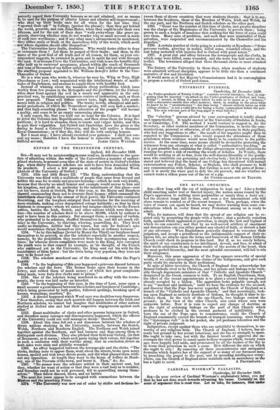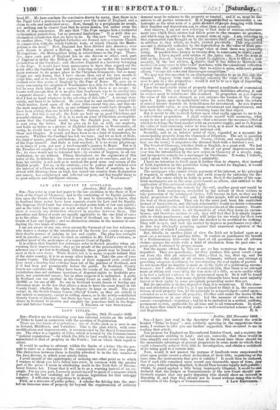CARDINAL WISEMAN'S FALLACIES.
Cambridge, 2d December 1850. Six--In your review of Cardinal Wiseman's explanatory letter, you say that he has not done much towards advancing his cause. Certainly on the aeon of sagument this is most true. Let us take, for instance, that under head.11/. He here combats the conclusion:drawn by many, that.there Man the Papal brief a pretension to supremacy over the realm of England, and a claim to sole and undivided sway. Mow, though by a periphrasishe avoids, yet nothing can be clearer than that home= demo, but rather owns the truth of this conclusion. He says that: "too Pope assigns him a ternterial erelatiastieal jurisdiction, but no personaLlitnitatims." It is with this ec- clesiastical jurisdiction that ,we have to do. By this, new "boon," says he, in another place, " the English Catholics are formed into a separate Mulch in conjunction with the whole Catholic, body, of which Church the Metro- politan is the head." Now, England has been divided into dioceses; over each diocese is placed ,a .Bishop; each Bishop owns as his superior the Metropolitan ; the Metropolitan -being in subservience to the Pope. There- fore, since each pert of En ad lies in one diocese or other, each part of England is under the Bishop, of some see, and so under the territorial jurisdiction of the Cardinal; and therefore England is a territory belonging to the Pope. It would have been unnecessary -to have thus argued out the point .after the Cardinal .bad told his believing subjects that .England was again restored to its proper place in the Christian'firmament ; but so many things are only forme, that i have chosen thus out of his own mouth.to judge him, and so to show that supremacy and sole and undivided sway are claimed over this realm of England by the Pope of Rome. He goes on to argue concerning the adoption of Westminster as alitle for the Metropolitan, but he soon finds himself in a corner from which there is no escape : he knows well enough that it is no plea that Southwark was to be erected into a separate diocese ; so the excuse comes in handy, " I can sincerely add that I had no hand whatever in the selection of this title." A strange story surely, and hard to be believed. He owns that he and another arranged the whole matter, fixed upon all the other titles except this one, and this one the most important ; the first, as any ordinary man would have thought, to have been settled, this one he left to others. Curious, certainly ; but we will leave it. But this is not all; the Irish are held up as good Christians and peaceful citizens. Surely, if it is to such an acme of Christian accomplish- ments that the Cardinal would bring the English poor, the sooner he is sent away the bettor. But he goes on to tax us with our neglects, and holds up before us a picture of frightful destitution in Westminster, all owing, he would have us believe, to the neglect of the laity and godless Dean and Chapter. It would not have been so in a land of monasteries, he remarks. Whither the Cardinal has led, we turn ; and let us look at Italy, the land of monks, priests, and bishops, yea, blessed by the cheering influence of the Pope himself. And Italy is soon reached ; it is no weary pilgrimage as in times of yore, not now a twelvemonth's journey to Rome. But is it the Paradise we sought—is it the home of virtue, industry, and contentment ? No; its vices would not be tolerated here ; its swarms of beggars, in all our destitution, we are without. Flimsy throughout are the arguments of this letter of the Archbishop ; his reasons are not such as to convince, and let us hope his subtilty is not such as to mislead the good sense and reason of the English people. Let us, on the contrary, ever bejealous and watchful over the interest of a Church which, as watered by the blood of martyrs, so be- dewed with blessings from on high, has raised our country from degradation and misery, has enlightened and relieved our poor, and has taught them to be good subjects and intelligent citizens. "A Wszensissi."

























 Previous page
Previous page